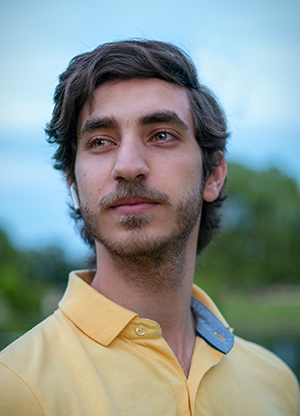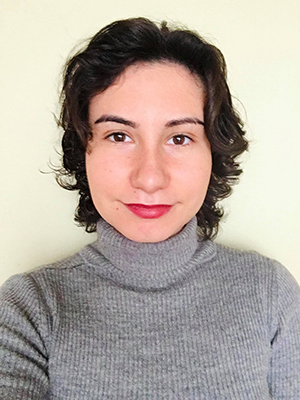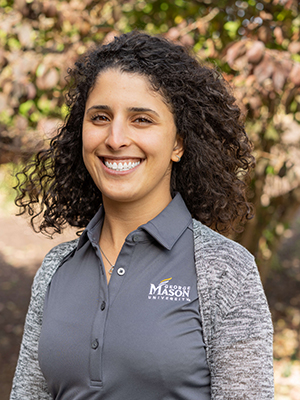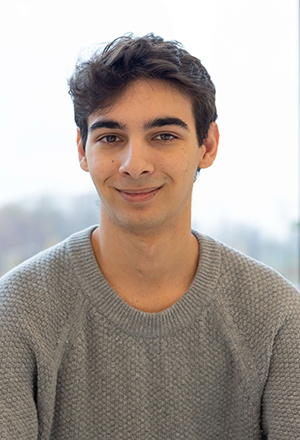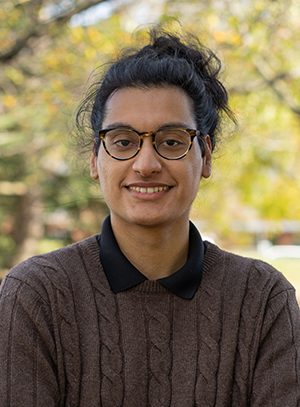Mohammed Saffouri
Film and Video Studies
Life hasn’t slowed down for graduating film and video studies major Mohammed Saffouri since he completed his award-winning documentary “The First.”
“The First,” which Saffouri created for the FAVS 365 Documentary Filmmaking class, follows 24-year-old Libyan American Abrar Omeish as she campaigns for and wins a seat on the Fairfax County School Board in 2019, becoming one of Virginia’s youngest elected officials and the first Muslim woman on the board.
The documentary garnered Saffouri a prestigious Capital Emmy from the National Academy of Television Arts and Sciences, National Capital Chesapeake Bay Chapter. The accolades didn’t stop there. The documentary was featured in a number of film festivals, winning the Student Documentary Grand Prize at the March on Washington Film Festival and the Best Short Documentary at Georgia’s Broad Street Film Fest.
Saffouri has spent the past year and half preparing for and making his senior film, which is currently in post-production. The narrative film is based on his grandfather’s experiences as a young soccer player who makes the national team just as his family is forced to emigrate from his native Palestine.
The film, titled “Touchline,” was shot in Jordan last summer. Saffouri worked with a producer there and said the shoot was a challenging process not only with the pandemic but because it is a period film set in 1948.
“We had to rent antique cars,” he said. “We shot in the cities of Amman and Al-Salt. We used Al-Salt because it looks like Haifa would have in 1948.”
The pre-production work for “Touchline” was completed at Mason with the help of the Film and Video Studies faculty, he said. Although the pandemic delayed the project, Saffouri said the attention his documentary received definitely made making his senior film easier, especially in terms of raising money for the production.
As the end of his college career approaches, Saffouri is working with film professionals in Qatar, Los Angeles, and Egypt to complete “Touchline,” which he plans to enter into a number of international film festivals.
“[“The First”] was a requirement for a class,” Saffouri said. “I was using it to see how the [film festival] process worked and was surprised by the amount of recognition it received. It definitely was a good way to market myself and helped tell people who I am.”
“Mohammed is one of those rare students whose drive and dogged passion for creating films by any means necessary eclipses most,” said filmmaker Nikyatu Jusu, an assistant professor in the Film and Video Studies Program. “His desire to create authentic films related to his specific cultural/ethnic existence is necessary within an often-homogeneous canon of cinema. We are all perpetually inspired by his contagious tenacity.”
— Colleen Kearney Rich
Trinidad Lara
Anthropology
Trinidad Lara was born in Santiago, Chile, and also lived in Japan and Russia with her family before settling in Newport News, Virginia.
While at Mason she also studied abroad for a year and a half in France. All of those experiences contributed to her major in anthropology.
“For me, I was always an outsider and always looking at society from my particular standpoint,” she said. “The experience of growing up and being a bit different and being interested in what was going on in different cultural context, definitely pushed me to wanting to pursue an area of study that helped me to further explore these questions.”
A member of Mason’s Honors College, Lara came to the university on the recommendation of a high school advisor and because of its proximity to Washington, D.C. She said she found Mason’s campuses—the most diverse among Virginia’s public research universities—a rewarding amalgam of ideas.
“Looking back on the experience, I gained so much,” Lara said. “I had great professors. I met some great people, and my experience within my classes, the various perspectives, was so rewarding.”
“She’s just a joy to be around,” said Andy Hoefer, assistant dean of the Honors College. “She’s pursued every opportunity available to her at Mason with a wide-open heart and a sense of adventure.”
After she graduates in December, Lara said she wants to work in a field related to anthropology, perhaps at a refugee agency with which she is already familiar. With her theater minor, she might even become a playwright as a way to convey what she has discovered in her field of study.
“Culture, in a way, is a collective performance,” she said. “We perform our identities, our roles, so there’s a lot of connection between the two.”
— Damian Cristodero
Fatiha Tabibipour
Government and International Politics
Born in Morocco and raised in Italy, Fatiha Tabibipour said she has been fascinated with politics since she can remember. Coming to the United States as an au pair exchange student in 2014, she later enrolled at George Mason University, where she learned about the U.S. Supreme Court, and was inspired anew.
“What inspired me is the history of bipartisanship, the history of believing in the law and ruling by the law and the constitution, not by what one administration wants,” she said.
The government and international politics major said she hopes her degree “will open doors in the NGO world and the government world.” She’s also considering law school.
“I want a job that can help me make a difference,” Tabibipour said, “[particularly] in the U.S. government or regarding human rights.”
During her time at Mason, Tabibipour interned with the Arab American Business and Professional Association, helping research and draft communications to support their mission of helping minorities achieve roles in public service.
She also helped code and analyze legislative bills passed by Virginia and Pennsylvania through Mason’s Office of Student Scholarship, Creative Activities and Research (OSCAR).
Tabibipour said her OSCAR research was complex and an incredible learning opportunity, as was her entire Mason experience.
“I love that so many professors are very successful and come from different backgrounds from the Department of State, Department of Defense, or other agencies,” Tabibipour said. “[The professors] have not just a knowledge of the book, but the knowledge of the real world that many of us in the Schar School want to experience.”
— Mariam Aburdeineh
Cory Jack
Economics
Cory Jack, who just turned 20, isn’t about to slow down. After graduating high school in Northern Virginia a year early, he finished his studies at George Mason University in two-and-a-half years. Jack loaded up on classes during the summer and academic year because he wanted to graduate early.
“I am ready to assume short-term costs for long-term gains,” Jack said. “If I can make it easier for myself down the road by working hard up front, I’d rather do that.”
An economics major and member of Mason’s Honors College, Jack also managed to find time to intern at the White House, act as an Honors College peer mentor and work for the Madison Coalition, a political advocacy group. In addition, he received the Joseph Schumpeter Fellowship from Mason’s Mercatus Center. Jack also has minors in criminology, law and society and data analysis.
Jack plans to go to law school next year. He’s considering practicing antitrust law, although he’s also interested in politics or perhaps pursuing a doctorate in economics.
“There is no doubt that Cory is a very bright and talented student,” said Jason Dunick, director of undergraduate programs for the Economics Department in the College of Humanities and Social Sciences. “But further, he is able to pair that ability with a high level of intellectual curiosity. I am certain those things will take him far in his career.”
— Anna Stolley Perskey
Syed Abbas
Biology, Neuroscience
Syed Abbas’ days as an undergraduate student at George Mason University and a member of the Honors College will soon be over, but his presence on campus will extend far longer.
That’s because the Arlington, Virginia, native who majored in biology and neuroscience has created a legacy for himself after completing an impressive Office of Student Scholarship, Creative Activities, and Research (OSCAR) undergrad research project that saw him help construct Greta Ann Herin’s neuroscience lab from scratch.
Using the $1,500 they each received for their OSCAR grants, Abbas and classmates Ali Ahmad and Paresha Khan created a fully functional lab, setting up servers and software, putting up microscopes, creating an electronics rack and perfusion system, and connecting the electronic equipment.
“It’s going to help people learn after I’m gone,” Abbas said. “I’m not the only one using it. Mason students after me are going to be using it and getting research experience.”
Herin, his advisor, called him “an invaluable resource.”
“He really helped build the lab from the ground up,” she said.
Abbas’ contributions to the community don’t stop there. In 2019, he founded the nonprofit George Mason Food Assistance Club to help feed the hungry. The organization has more than 100 members.
— John Hollis

